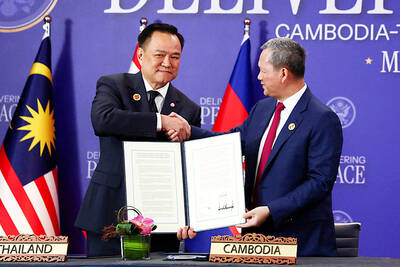The Republican Party on Saturday revealed an unconventional temporary plan to fund the US government, with little room to maneuver it through a deeply divided US Congress just days ahead of a potential shutdown.
New US House of Representatives Speaker Mike Johnson said the two-part move was “a necessary bill to place House Republicans in the best position to fight for conservative victories.”
US media reported that an unusual play would see some bills needed to keep the government open passed via a short-term bill until Jan. 19, while the rest would be rolled over until Feb. 2.

Photo: EPA-EFE
It is aimed at buying Congress time to pass individual spending bills — and does not provide funding for Israel, Ukraine and border security, the reports said.
However, with some Republicans complaining that the plan does not make the funding cuts they seek, it was unclear if the party, which has only a narrow majority in the House, would be able to pass it.
“The bill will stop the absurd holiday-season omnibus tradition of massive, loaded-up spending bills introduced right before the Christmas recess,” Johnson wrote on X, formerly Twitter, without offering details.
“Separating out the CR [continuing resolution] from the supplemental funding debates places our conference in the best position to fight for fiscal responsibility, oversight over Ukraine aid and meaningful policy changes at our Southern border,” he said.
Republican US Representative Chip Roy was among those quickly voicing dissent from the party’s right, writing on X that his opposition to the plan “cannot be overstated,” and saying that it does not cut spending enough.
The White House said the plan was “a recipe for more Republican chaos and more shutdowns.”
“House Republicans are wasting precious time with an unserious proposal that has been panned by members of both parties,” White House press secretary Karine Jean-Pierre said in the statement.
Federal government funding expires at midnight on Friday into Saturday.

Shamans in Peru on Monday gathered for an annual New Year’s ritual where they made predictions for the year to come, including illness for US President Donald Trump and the downfall of Venezuelan President Nicolas Maduro. “The United States should prepare itself because Donald Trump will fall seriously ill,” Juan de Dios Garcia proclaimed as he gathered with other shamans on a beach in southern Lima, dressed in traditional Andean ponchos and headdresses, and sprinkling flowers on the sand. The shamans carried large posters of world leaders, over which they crossed swords and burned incense, some of which they stomped on. In this

‘NO COUNTRY BUMPKIN’: The judge rejected arguments that former prime minister Najib Razak was an unwitting victim, saying Najib took steps to protect his position Imprisoned former Malaysian prime minister Najib Razak was yesterday convicted, following a corruption trial tied to multibillion-dollar looting of the 1Malaysia Development Berhad (1MDB) state investment fund. The nation’s high court found Najib, 72, guilty on four counts of abuse of power and 21 charges of money laundering related to more than US$700 million channeled into his personal bank accounts from the 1MDB fund. Najib denied any wrongdoing, and maintained the funds were a political donation from Saudi Arabia and that he had been misled by rogue financiers led by businessman Low Taek Jho. Low, thought to be the scandal’s mastermind, remains

Near the entrance to the Panama Canal, a monument to China’s contributions to the interoceanic waterway was torn down on Saturday night by order of local authorities. The move comes as US President Donald Trump has made threats in the past few months to retake control of the canal, claiming Beijing has too much influence in its operations. In a surprising move that has been criticized by leaders in Panama and China, the mayor’s office of the locality of Arraijan ordered the demolition of the monument built in 2004 to symbolize friendship between the countries. The mayor’s office said in

FIGHTING CONTINUES: Thai military dropped 40 bombs on border areas, Cambodia said, while Bangkok said Phnom Penh launched heavy attacks and damaged homes Cambodia yesterday accused Thailand of intensifying its bombardment of disputed border areas, even as officials from the two countries attend a multi-day meeting aimed at negotiating an end to deadly clashes. The neighbors’ long-standing border conflict reignited this month, shattering an earlier truce and killing more than 40 people, according to official counts. About 1 million people have also been displaced. Cambodian and Thai officials were in their third day of talks at a border checkpoint, with ministers of defense from the two countries scheduled to meet today. However, the Cambodian Ministry of National Defense said Thailand’s military carried out a heavy